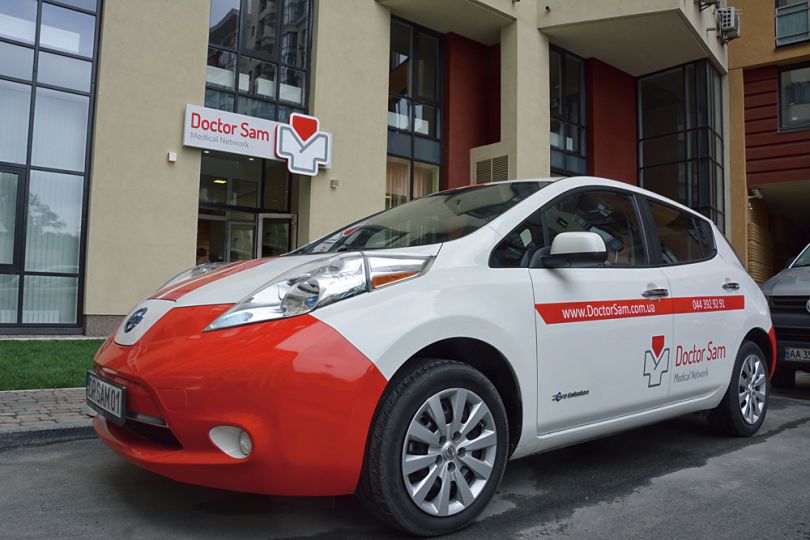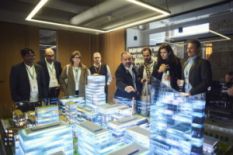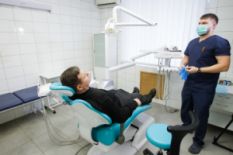“Applying for globally recognized standards in medicine was quite a demanding challenge for me and my team, and we had to do a lot of work, — Sam Aganov, the Founder and Chief Executive Officer of Doctor Sam Medical Network says. — But meeting them is a promising change to the entire Ukrainian healthcare system”.
Why have you decided to apply for JCI accreditation?
From the very beginning when I first conceived this project in 2014, I was sure of a few things. I was sure I was going to find the right people for the right job. I was sure I can show that medicine can be provided in a comfortable & compassionate atmosphere and be affordable to Ukrainian patients. And I was also sure we will go for the JCI accreditation.
I worked as a healthcare executive in the USA in different hospitals over the years but I’ve never worked in a hospital that wasn’t Joint Commission-accredited. Back home, it’s a must, not an option. Because, in all fairness, that is truly a widely recognized gold standard in medicine. Joint Commission is the oldest, time-tested United States-based quality system created specifically by clinicians.
Nowadays, the Joint Commission International standards are used in more than 90 countries. And I hoped we could add Ukraine to that list. Some people said it would take twenty years for Ukraine’s healthcare industry to meet JCI standards, but we have proved that it is, indeed, possible. Every one of Doctor Sam’s clinics is accredited — the first three in Ukraine! I wonder who’d be the forth?
Now, having universally recognized JCI Gold Seal of Approval, what will change for your patients?
I found myself in funny situation. While working in the USA as a healthcare executive I’ve gone through JCI accreditation a number of times. But I’ve never been in a position when I have to explain what it means. Generally, there is a rule in JCI: if the Joint Commission standards are stricter than in a country you have to go by the JCI standards, if it’s the other way on, you may use a local standard.
Most JCI standards are stricter than ours in Ukraine, so we’ve got to up the level of healthcare in many different areas. First and for the most it’s a patients safety. We’ve also basically implemented the American standards for confidentiality. We’ve made our staff fit JCI demands which considers hiring persons, training them, having them go through an adaptation and then assuring that they have a necessary qualifications along the way.
JCI standards require continuous performance-improvement. Are you ready to meet it?
Sure. It’s built into the JCI approach. Basically now that we’ve got accredited we have to get reaccredited, if we want to — which we do — every three years. But in between those three years, and it’s in our contract with JCI, they have a right and they exercise that right (which I know from my experience) to do what is called unannounced surveys. If I say unannounced I mean unannounced — they don’t give you any heads up. We already know that we can expect them any day. Any day they can walk in and do their survey and that always keeps you on your tiptoes.
When we’ve started very intensive period of preparation for the JCI we’ve set exact day and exact time for what we’ve called the JCI meeting. And that meeting is still in our schedules. We have it the same day and the same time as we did before because we will still have many things to talk about, including statistics, protocols, approaches etc. Nothing has changed neither for me, nor for my team and now it’s a part of our everyday routine. That’s the only way to ensure you will keep the level and be ready in three years.
What are your future plans in Ukraine?
Initially our idea was not just to open a few small clinics but to open a hospital. We’ve opened three clinics within two years than we took one year to really intensively focus on quality because it is easier to standardize it on a smaller network. And now when it’s standardized we may expand it more easily. We still plan to expand our network and to add a hospital to provide secondary medical care. But we want to do it without compromising anything in quality.
Have you ever thought about opening clinics in other Ukrainian cities?
It’s possible. I just want to develop a good infrastructure here in Kyiv only because for me it’s easier to ensure the level of quality when it’s localized. Once we do this, we would be in a good position to may be expand nationally, which I don’t mind at all.
Which are the main problems of Ukrainian healthcare and which are the steps we should take to change the situation?
I haven’t found any healthcare system that is perfect. And Ukraine is not an exception. But I think the better approach is to focus on solutions, on what we can do and where we can get some wins — it may be something little or something major. If we were lucky enough to get the JCI accreditation, we may bring the change in to the healthcare landscape of a country by setting a new bar for quality. So we chose to focus not on the problems, but on solutions instead.
What do you think about digital transformation in Ukraine’s medicine: is it really necessary and is it possible at all?
I think it’s both. But most, I think it’s inevitable. For example, in the USA telemedicine started just because of the need: there are rural areas where it’s very difficult to licensed physicians to go and practice because of the long distance. So as a solution to this telemedicine and telemetry was born — and now it is used worldwide. Also in the USA country said: from this day on there would be only electronic medical records all the way through so you have to switch from paper to e-records. We have time to adjust but there was very clear massage: who ever doesn’t make an adjustment won’t be in business.
Some changes happen because of the need in a market, some because country decides we need to move on that direction and some changes will happen because innovators will constantly push the limits. I think for us all three will work. And for Ukraine as for any other country digitalization in healthcare is inevitable. If you can keep the base you can be competitive, if you do not — you can’t survive in medicine now.
Do we need any government regulation in this area?
In all the models that I’m thinking which are working well there’s a combination of the creativity and drive from the private sector and some regulation from the state. To find the optimal balance between two of them that is tricky. The fact that you need both I think is clear but to which degree and in which areas that is the question.
How is it to do business in Ukraine in such difficult times for the country and yet to be successful?
On the one hand, business is business. In many respects, you have to use the same focus, the same intensity, the same drive for innovation here as anywhere else. You may use strategies you’ve already had and you’ve sharpened them over the years, if they work. On the other hand (and I felt it as well), as a professional you have to reinvent yourself. Because there are some things that just don’t work the same way here because of the local specific, of the culture, legislation, the competitive arena and so on.
One of the things that I found to be harder to do here in Ukraine is to plan ahead because things are changing fast, things are unpredictable, things change for reasons sometimes you can’t foresee or even understand in retrospect. But that’s what keeps you coming back to work every day with interest. So what you have to learn here is to be much more alert, much more flexible and much more Zen I would say. If you keep focusing on what’s not working out, you going to have a hard time here. Because all your energy goes to something negative and there is nothing left for positive. What is exciting for me here is that you have to live it day in and day out. And, being a psychologist in this business environment certainly helps.
Do you remember your impressions when you first came to Kyiv?
I came here in the end of 2011 or in 2012 and I don’t remember the first few months in Ukraine at all — it’s blurred. Kyiv? You know, I think it is very difficult not to fall in love with it. There are awesome people here, I like the city and I like the fact that we are doing something that is meaningful here. I want to instill in my child (I have a daughter who is growing up, faster than I want) a value of not just working to make a living, not just making money. You also have to do something that creates a positive change. And doing what we do here I feel it every day.
And more important than that, when I come to work, I see lot of people working as one team here who count the same feeling and share the same value. That’s important to us, to their families, to the city, to this country when it comes to bringing the highest quality standards into the local medicine. That’s tremendously motivating and empowering to find something that you love doing, something being very meaningful and being able to find enough people to surround you who share that value and that believe.
Was it easy for you to integrate in the local culture? Are Ukrainians enough open-minded to easily communicate with foreigners?
In any country I travel to I find people who are super tolerant to foreigners. I don’t know whether they are as tolerant to each other (that vary from culture to culture) but for the foreigners they are opened, polite and extremely patient. They will explain it to you three times if needed. I love to be a foreigner in ever country, because you come in and you can give away with being stupid, silly, funny, ask questions that nobody else will ask. And with me in Ukraine it’s also the same. As I learn the language and mispronounce a word people are very patient in correcting me, it’s always done in good spirit and good cheer. I feel very safe here and very friendly.
You and your family constantly live in Kyiv. Can you call it your home?
Initially when I was first looking for the project here I was flying back home all the time. I spent so much time in the plain I’m surprised they didn’t give me the pilot license. Then we’ve made a conscious choice to make Kyiv our home for at least a number of years. It wasn’t adjustment for my wife — she is Ukrainian, but that was quite a challenge for my daughter — she was six then and didn’t speak Russian or Ukrainian. If you talked to me first couple of years after we’ve moved here then I would use worlds like “ours” meaning the States and now by “ours” I mean Ukrainian. So mentally, that shift took place for sure. We are happy with our decision to live in Ukraine and I think it’s a good country to call home.
Have you travelled over Ukraine and what is your favorite destination if you did?
 I haven’t travelled as much as I wanted to, but I still plan to. One of the beautiful things in the States is that they are very different. When you travel from one place to another you can see climate is different, nature is different, architecture is different, people are different. But I found this to be true to Ukraine as well. When we go to visit my wife’s family in Dnipropetrovs’k I enjoy driving because I like the sights (but I don’t enjoy the roads so much for sure). When we went to western Ukraine I truly loved it. It was very different: language is different, people are different, attitudes are different, architecture is different (reminding me European architecture in many ways), it was completely different — like if we were in other country. That’s what I like about it: you can go to different places and experience different subcultures.
I haven’t travelled as much as I wanted to, but I still plan to. One of the beautiful things in the States is that they are very different. When you travel from one place to another you can see climate is different, nature is different, architecture is different, people are different. But I found this to be true to Ukraine as well. When we go to visit my wife’s family in Dnipropetrovs’k I enjoy driving because I like the sights (but I don’t enjoy the roads so much for sure). When we went to western Ukraine I truly loved it. It was very different: language is different, people are different, attitudes are different, architecture is different (reminding me European architecture in many ways), it was completely different — like if we were in other country. That’s what I like about it: you can go to different places and experience different subcultures.
As a psychologist, can you name the features of successful and happy person in modern high tech world?
Remaining true to yourself is definitely a must. Because in a modern, high tech world, it’s easy to lose your identity sometimes. Staying true to the core that is YOU is important. And also, having a sense of humor. Because no matter what your plans are, no matter how prepared you are, no matter how well trained you are — life will surprise you. And that’s when you need a sense of humor.
Do you have these features? Do you feel happy right here right now?
Certainly, I feel quite fortunate, to be honest. There is one thing that could make or break someone’s life, and that is — having the right people around you. I don’t really feel like I am working on it, and yet I’m constantly surrounded by awesome people and that helps me keep true to my core; it helps me keep pursuing my dreams; and it helps me do something meaningful, kind, compassionate. And, yeah, that makes me happy!
What are your recommendations for expats who come to work and live in Ukraine?
First off — come, work, and live in Ukraine! For some time now, people are not sure whether it’s safe to do business in Ukraine, whether there is good economic growth ahead, whether it makes sense. I think people of Ukraine, especially in the last few years, showed that you can’t break their spirit. And a country, were you can’t break people’s spirit, has got a tremendous future, that’s for sure. My massage would be: come and work here, and you would be rewarded for doing this because that is a very rewarding place to be.









